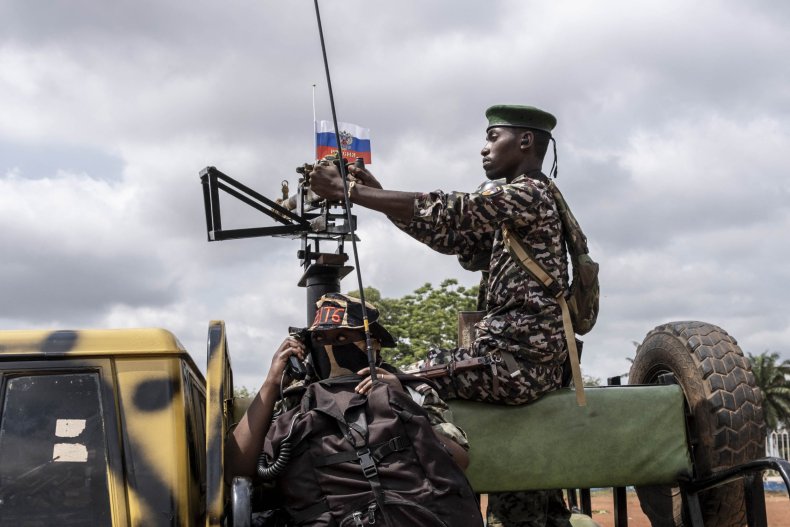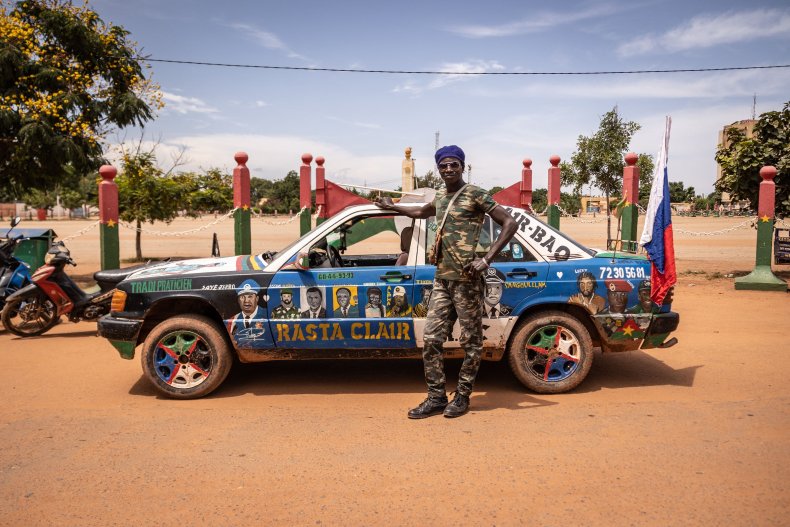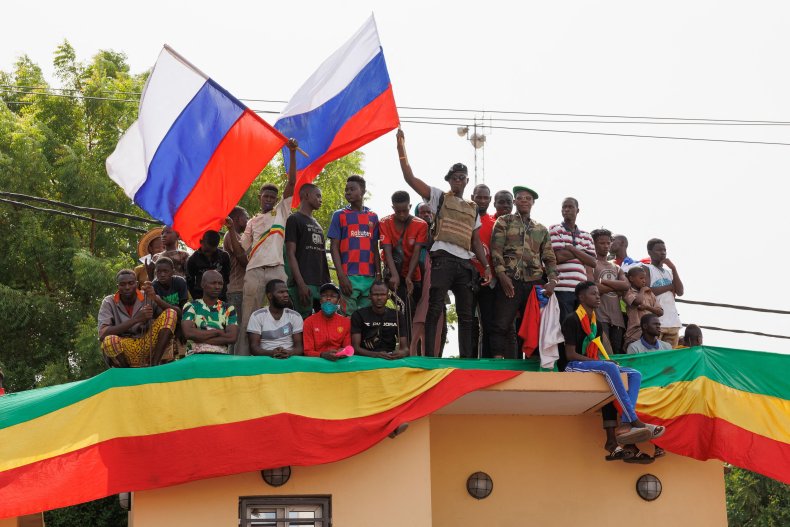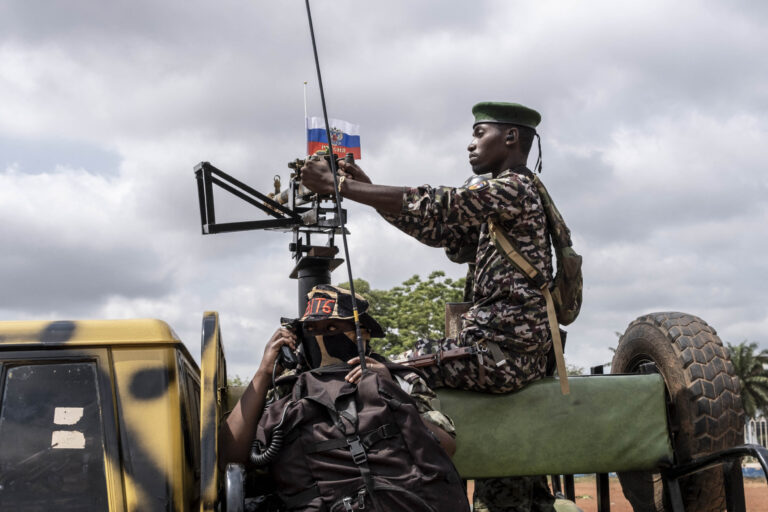As tensions between Russia and the West rage over the ongoing war in Ukraine, a senior Moscow diplomat has told Newsweek that a new front has emerged in Africa, where he envisioned a collapse of colonial influence and the dawn of a new mutually beneficial order for both the continent and the Kremlin.
“Highly dynamic Africa holds a special place in today’s decreasingly Western-centric world order, which explains the surge of interest in the region among many international partners,” Ambassador-at-Large Oleg Ozerov, who serves as head of the Russia-Africa Partnership Forum, told Newsweek.
“Russian leadership regards developing ties with the continent as a strategic foreign policy objective,” he added.
Ozerov recalled Moscow’s still-influential anti-imperialist legacy across the continent that today consists of 54 countries and roughly 1.4 billion people. In the midst of the Cold War, the former Soviet Union was a leading supporter of anti-colonial rebel movements that went on to win their independence from ruling Western powers.
But he noted that this cooperation had “considerably slowed down following the breakup of the USSR” three decades ago.
A new effort has emerged to revitalize these ties, however, in the wake of the first Russia-Africa Forum held in October 2019 in Sochi.
A second summit is planned for next summer in Saint Petersburg, and Ozerov was hopeful that it would result in a flourishing of Moscow’s ties to Africa, which he argued would help to fulfill the decolonization project that he argued “had not been completed” due to the advent of a Western-led international economic system.
“This is voiced by the Africans themselves, who are less and less satisfied with financial handouts as well as the World Bank and the International Monetary Fund’s stringent lending conditions,” Ozerov said, “which prevent Africa from embarking on a large-scale industrialization and fully benefitting from its enormous natural resources and human capital.”
“The continent is being actively exploited by Western transnational corporations, polluted by environmentally hazardous production and stripped of its mineral resources,” he added.
He also asserted that “the U.S. and European states are imposing their military presence on African countries under the pretext of providing protection against international terrorism” with campaigns in the Sahel such as the French-led Operation Serval and Operation Barkhane, which were formally ended last month amid political disputes between Paris and regional governments, as well as the 2011 NATO intervention that backed insurgents who ultimately toppled longtime leader of Muammar el-Qaddafi.
The fall of the former Libyan state gave rise to a wave of unrest in Sub-Saharan Africa, and Ozerov argued that Western efforts have since only begotten more conflict, as well as crises in economies, migration and the trafficking of humans and narcotics.
Against this backdrop, he argued that “today, we are witnessing the entire model of international relations being reshaped, with the ‘collective West’ losing its position as the world’s only center of power.”
“We see Africa awaking and establishing itself as a separate self-sufficient pole,” he added.

BARBARA DEBOUT/AFP/Getty Images
The renewed push to promote Russia-Africa ties came amid a near-total breakdown in Moscow’s relationship with the West and its allies.
These ties had been strained over an array of geopolitical issues since President Vladimir Putin took the helm of the Russian Federation more than two decades ago, but the Kremlin’s decision to launch a war against neighboring Ukraine this past February has wrought an unprecedented coalition of sanctions against Moscow.
In this endeavor, President Joe Biden managed to rally a number of allies and partners in an attempt to isolate Russia. Despite this, many African nations have remained largely neutral on the matter.
The issue has divided African countries in a series of votes at the United Nations and even most of those opting to condemn Moscow have continued to develop and advance bilateral relations.
Ozerov said he appreciated this “independent and principled stance of non-interference in conflicts outside their region.”
“Africa no longer wants externally imposed development models, values or ethical standards,” Ozerov said. “One striking example is the collapse of European neo-colonialism in the Central African Republic followed by those in Mali, Guinea, Burkina Faso, the dissolution of the so-called France-Afrique system.”
But, “nevertheless,” he noted that “it should be acknowledged that the transformation of Russia-Africa cooperation is not a smooth-sailing journey.”
In addition to “a low trade turnover” of just $18-20 billion per year, Ozerov warned that “we have been dragged into a heavy confrontation with the West that seeks to strip Russia and other states of their independence and sovereign rights by applying collective punishment, violating fundamental political and economic rights, introducing harsh illegitimate unilateral restrictions.”
He referred to the array of measures targeting not only Russia’s economy, but also its political and cultural influence, as part of “the toughest restrictions world history has ever known, which have led to catastrophic consequences for global food and energy markets.”
Such moves, he argued, “ruin not only ties between Russia and the West but also the entire worldwide economic system, including WTO rules and regulations, built by the West itself.”
“This counterproductive practice is also used against African partners,” Ozerov said. “Can anyone, including the authors of the sanctions, indeed regard unilateral restrictions imposed on Burundi, the Central African Republic, the Democratic Republic of Congo, Ethiopia, Libya, Mali, Somalia, South Sudan, Sudan and Zimbabwe as effective?”
“The answer is clear,” he added.

OLYMPIA DE MAISMONT/AFP/Getty Images
U.S. officials such as Ambassador to the United Nations Linda Thomas-Greenfield have also made a point to emphasize that Africa-Russia trade in all but food and agriculture was subject to sanctions imposed by Washington on Moscow.
These warnings came as both the U.S and Russia intensified their engagement with the continent over the summer, sending their top diplomats on multinational tours.
Speaking from the Ethiopian capital of Addis Ababa in late July, Russian Foreign Minister Sergey Lavrov criticized what he called “attempts by the United States and its allies to impose their views and development models on other nations and to promote their geopolitical zero-sum games run counter to these principles.”
Less than two weeks later, U.S. Secretary of State Antony Blinken delivered a Sub-Saharan policy speech in the South African capital of Pretoria, emphasizing that Washington was looking for clear condemnation of Moscow from the continent as “the United States and the world will look to African nations to defend the rules of the international system that they’ve done so much to shape.”
Ozerov, for his part, made a point to distinguish Moscow’s approach to Africa from that of Washington.
“Unlike the United States, which has made it a strategic priority to offset the growing Chinese and Russian influence in Africa, devising unimaginable bills to ‘counter Russia’s malign influence in Africa,'” Ozerov said in reference to proposed legislation introduced to Congress in March, “we are guided by the principle of mutually beneficial cooperation.”
“It implies that each nation has the right to choose its political and economic partners,” Ozerov said. “We are ready for fair economic competition.”
Whereas Beijing has won over much of the continent through ambitious economic partnerships, including those linked to President Xi Jinping’s Belt and Road Initiative, Moscow has largely stepped in with security assistance, both officially and through private military organizations such as the Wagner Group, a group that first came to international light amid the first outbreak of unrest in Ukraine in 2014.
At an October 6 gathering of the U.N. Security Council, Washington’s Thomas-Greenfield asserted, “Make no mistake: People across Africa are paying a heavy price for the Wagner Group’s exploitative practices and human rights violations.” Her Russian counterpart, Vassily Nebenzia, dismissed the accusation as “anti-Russian rage” that “exposes their real plans and aims—what they really need from African countries.”
Today, in a number of African nations such as Burkina Faso, the Central African Republic and Mali, the lasting influence of former colonizer France has been increasingly under fire in favor of a greater role for Russia. Moscow has also made significant inroads in still-conflict-ravaged Libya as well as Algeria, Egypt, Eritrea, Ethiopia, Madagascar, Mozambique, South Africa and Sudan, among other African nations.
From 2017 through 2021, Russia also commanded a significant lead in weapons exports to Africa, accounting for some 44 percent of major arms transfers to Africa, more than the U.S., China and France combined, according to the Stockholm International Peace Research Institute.

OUSMANE MAKAVELI/AFP/Getty Images
But Ozerov again struck a distinction between Africa-Russia relations and the policies pursued by Western powers.
“Yet, neither we, nor Africans need foreign command,” he added. “We stick to the formula ‘African solutions to African issues’ and seek to promote a comprehensive approach to the existing problems, with the African countries relying on their own economic resources to achieve industrialization and technological advancement.”
As the conflict in Ukraine continued to disrupt global grain supplies, a situation partially relieved by a Turkish-mediated deal signed by Moscow and Kyiv in July, Ozerov said food security would be a priority discussion at next year’s summit in Saint Petersburg and that Russia was prepared to meet commitments in areas such as exports of agricultural goods, fertilizers, energy and other essential goods.
Russia and Ukraine together account for nearly a third of the world’s wheat and barley exports, which are vital to maintaining food security across the globe, including across Africa.
Ozerov said Russia was “ready to provide free-of-charge grain supplies (500 thousand tons) to the countries in most dire need, as well as fully replace the Ukrainian grain, which accounts for only 2 percent of global production, at an affordable price to all interested countries.”
Russia’s leading export is energy. And, for African nations, Ozerov said Russia has “always advocated for the diversification of energy resources, including through construction and modernization of hydroelectric power plants, development of nuclear energy, and use of natural gas as a clean fuel to reduce the environmental impact—instead of letting this valuable resource be drained by the European markets.”
To address these challenges, he argued that “the ‘peaceful atom’ and the hydropower are a brilliant solution for energy transition” and that “Russia has a lot to offer to its African partners in this regard.”
Placing the cost of international aid to Ukraine at $75 billion, Ozerov suggested such a sum could instead be “channeled to help African countries.”
He argued Moscow would continue to “actively support projects by international development institutions in African countries aimed at facilitating economic growth and financial stability of national economies.”
“Rather than using Africa as a mere source of raw materials to feed their economies, world powers should promote the development of Africa’s internal markets,” Ozerov said. “We think it is right time to stop treating African nations barely as recipients of humanitarian aid, which does not solve the continent’s fundamental problems. What Africa needs is the transfer of technology and expertise, development of its own industry and critical infrastructure.”
And though Washington too has publicly vowed not to dictate the policies of African nations, the Russian diplomat asserted that the U.S. and a number of its Western allies were nonetheless attempting to impose their agenda in a number of ways, including on the war in Ukraine.
“African countries have the right to choose their political and economic partners without fear of reprisal, to uphold their own, rather than imposed, gender and other values, and to follow their own path of development,” Ozerov said.
“It is evident,” he added, “that accomplishing these tasks is much more relevant for Africa than allowing itself to be dragged into extra-regional conflicts such as the one happening in Ukraine.”



